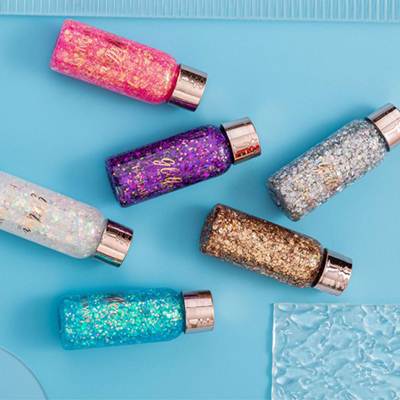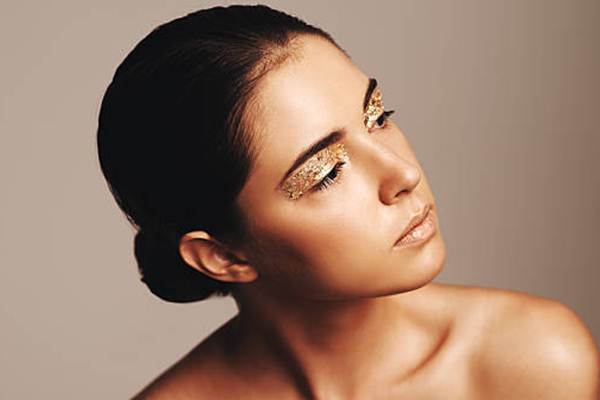Glitter, those sparkling, tiny particles often used for cosmetics, decorations, and crafts can bring sparkle and joy to various aspects of our lives. However, when glitter accidentally finds its way into our eyes, the situation can suddenly turn from gleaming to discomforting. In this article, we will explore the potential consequences of glitter getting into the eye, the importance of seeking medical attention if necessary and the immediate steps to take.
What Happens If Glitter Gets in Your Eye: Immediate Effects and Risks
When glitter enters the eye, it can trigger a range of immediate effects due to its sharp-edged, small particles. These particles can lead to redness, irritation, and a sensation akin to having a foreign object in the eye. The cornea, the protective layer covering the front of the eye, is particularly vulnerable to abrasions or scratches from glitter particles. This can lead to light sensitivity, discomfort, and even blurred vision. Additionally, glitter may introduce some contaminants or bacteria, increasing the risk of infection.
Initial Steps to Take

If glitter gets into your eye, the first instinct is usually to blink or rub vigorously. However, this can worsen the situation by pushing the particles deeper into the eye or further scratching the cornea. Instead, follow these steps to minimize discomfort and damage:
- Blink Frequently: Blinking frequently helps the eye’s natural tears move and may help dislodge the glitter particles. Allow your tears to flush out the damaging foreign material.
- Do Not Rub: Avoid rubbing the eye, as this can potentially cause more damage and worsen irritation.
- Use an Eyedropper: If water alone doesn’t work, you can use an artificial tear solution or a sterile saline solution to help flush out the glitter. A specialized eye wash kit or an eyedropper can assist in this process.
- Rinse Gently: If tears and blinking aren’t effective, rinse your eye with water. Use a sterile eyewash solution or a clean cup, if available. Shake your head sideways and pour clean water into the inner corner of the eye to let it flow on the eye and carefully wash out any glitter.
- Seek Medical Attention: If you experience persistent discomfort or if the glitter remains, pain, blurred vision, or redness, it’s essential to seek prompt medical care. An eye care professional can examine your eye, safely remove any remaining glitter particles, and provide proper treatment.
Importance of Medical Attention
While minor instances of glitter can often be resolved with the mentioned steps, it’s essential not to underestimate the possible risks. Even if the discomfort seems to go away or lessen, glitter particles may have caused microscopic scratches on the cornea that aren’t immediately noticeable. These abrasions can lead to complications if left untreated and become more painful.
Glitter particles may become lodged under the upper eyelid in some cases, making them very difficult to remove without professional help. An eye care specialist will have the expertise and necessary tools to address such situations safely.
And what’s more, due to bacterial contamination introduced by the glitter, if an infection develops, it can escalate quickly and lead to serious complications, including corneal ulcers. These ulcers can result in vision loss if not managed promptly.
Preventing Glitter-Related Eye Incidents
The best way to manage glitter-related eye incidents is to prevent them in the first place. When working with glitter, take the following precautions:
- Apply Glitter Safely: When using glitter cosmetics, apply them gently to avoid getting glitter particles in your eyes. Be carefull when handling glitter-containing products near your face.
- Wear Protective Eyewear: If you’re engaging in activities that involve glitter, such as working or crafting with glitter makeup, consider wearing protective eyewear to protect your eyes from accidental exposure.
- Avoid Blowing Glitter: Blowing on glitter, whether for play or artistic purposes, can inadvertently direct the particles toward your eyes. Select alternative methods to disperse glitter.
- Keep Hands Clean: Before touching your eyes, be sure your hands are clean to minimize the risk of introducing contaminants.
Conclusion: While glitter can add a touch of enchantment to a variety of aspects of our lives, it’s essential to exercise caution to prevent accidental exposure to the eyes. If glitter does find its way into your eye, swift and appropriate action is vital to minimize potential damage and discomfort. Remember, when in doubt, seek professional medical care to ensure yourwell-being and eye’s health.


